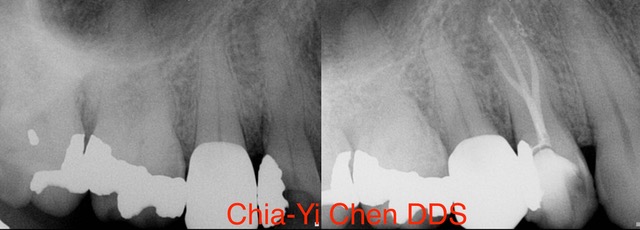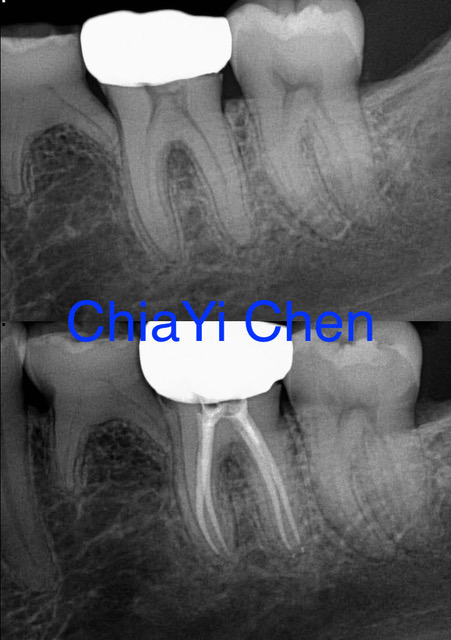Root Canal Treatment (Initial Rct)
A root canal treatment is a dental procedure that is performed to treat an infected or damaged tooth. It involves removing the pulp, which contains nerves and blood vessels, from the center of the tooth and then sealing it off to prevent further infection.
Root canal treatments are highly effective at saving severely damaged teeth that would otherwise require extraction. It allows you to maintain natural function and appearance while relieving pain caused by infection or injury.

Signs and Symptoms that You May Need a Root Canal
- Persistent toothache: One of the most common signs that you may need a root canal is experiencing a persistent toothache. This pain can be severe and throbbing, often occurring spontaneously or when you bite down on something.
- Sensitivity to hot and cold: If your tooth becomes overly sensitive to hot and cold temperatures, it could indicate the need for a root canal. This sensitivity occurs because the nerve inside the tooth is affected.
- Swelling in gums: Inflamed gums around a particular tooth can be an indication of infection or abscess. This swelling is usually accompanied by tenderness or even pus formation.
- Discoloration of tooth: A discolored tooth, especially if it turns dark grayish or black, can be another sign that you may require a root canal treatment. The discoloration happens due to damage or death of the nerve tissue in the tooth.
- Loose tooth: When an infection reaches advanced stages, it can cause bone loss around the affected tooth, leading to looseness. If you notice any movement in your teeth without any obvious reason, consult with your endodontist immediately.
If you're experiencing any combination of these symptoms, it's important to visit your endodontist as soon as possible for an evaluation. Remember, early detection and treatment are key to saving your natural teeth!
The Procedure of a Root Canal Treatment
When it comes to the procedure of a root canal treatment, it is important to understand that this is not as daunting as it may sound. In fact, with modern advancements in dentistry, the process has become much more comfortable and efficient.
To begin, our endodontist will start by numbing the area around the affected tooth using local anesthesia. This ensures that you feel little to no pain during the procedure. Once you are numb and comfortable, our endodontist will create a small access hole in the crown of your tooth. Through this access point, they will carefully remove any infected or damaged pulp from within the roots and chambers of your tooth. This helps eliminate any infection and prevents further damage to surrounding tissues.
After cleaning out all traces of infection, our endodontist will then shape and sterilize the canals before filling them with a rubber-like material called gutta-percha. This material provides stability and prevents reinfection.
In some cases where there is extensive damage or an increased risk of fracture, a dental crown may be recommended for added protection. Our endodontist will take impressions of your teeth to create a customized crown that perfectly fits over your treated tooth.
Although undergoing a root canal treatment may seem intimidating at first glance, it is actually an effective way to save an infected or damaged tooth from extraction. Thus, it's always best to consult with our endodontist if you suspect you might need this treatment so they can properly assess your situation and provide appropriate recommendations tailored specifically for you!


Conclusion
A root canal treatment is a highly effective and commonly performed dental procedure that can save your natural tooth and relieve you from the pain caused by infection or damage to the pulp. It involves removing the infected or damaged pulp, cleaning and disinfecting the root canal system, and sealing it to prevent further infection.
If you are experiencing any signs or symptoms such as persistent toothache, sensitivity to hot or cold foods/drinks, swelling of gums, or darkening of the tooth color, seek prompt dental attention. Your endodontist will be able to assess your condition and determine if a root canal treatment is necessary.
Remember that early detection and intervention are key in preventing further complications. Regular visits to our endodontist for checkups can help identify any potential issues before they worsen.
Opting for a root canal treatment when needed can provide long-term relief from pain while preserving your natural smile. So don't hesitate to consult with our endodontist if you suspect that you may require this procedure.
Maintaining good oral hygiene practices such as regular brushing twice daily, flossing daily, eating a balanced diet low in sugary foods/drinks, and visiting our dentist regularly will also contribute significantly towards keeping your teeth healthy and minimizing the need for invasive treatments like root canals.
Wish to learn more? Contact Big Apple Endodontics at (212) 980-7857 or visit our dental office located at 121 East 60th Street, Suite 4A, New York, NY 10022.
Office Hours
MON9:00 am - 4:00 pm
TUE7:00 am - 4:00 pm
WED - FRI9:00 am - 4:00 pm
SAT - SUNClosed


